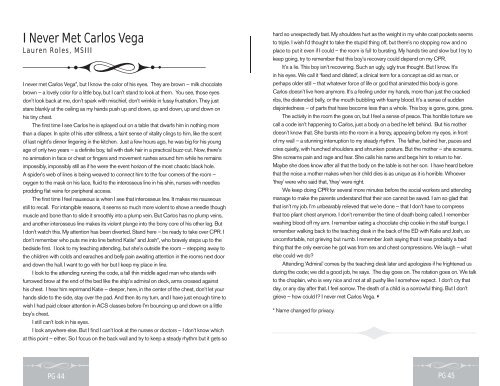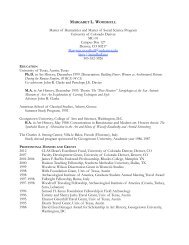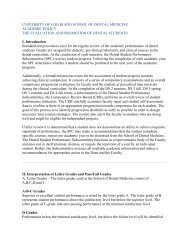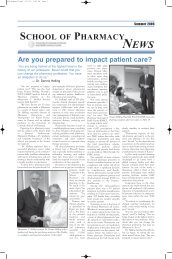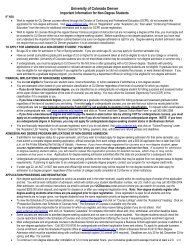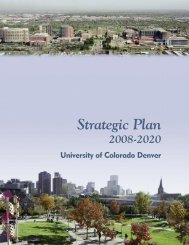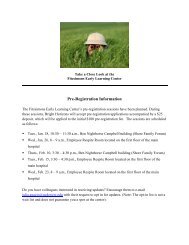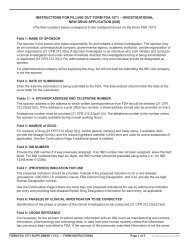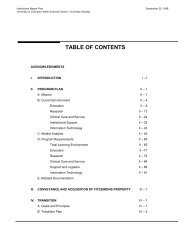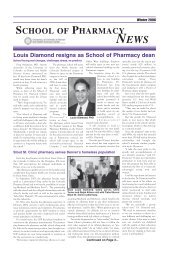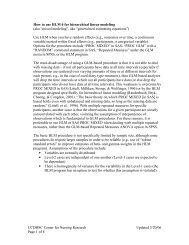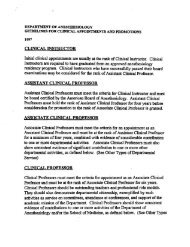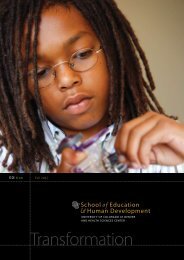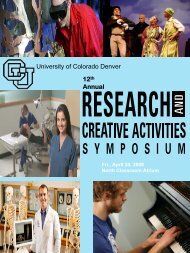The Human Touch 2013 - University of Colorado Denver
The Human Touch 2013 - University of Colorado Denver
The Human Touch 2013 - University of Colorado Denver
You also want an ePaper? Increase the reach of your titles
YUMPU automatically turns print PDFs into web optimized ePapers that Google loves.
I Never Met Carlos Vega<br />
Lauren Roles, MSIII<br />
I never met Carlos Vega*, but I know the color <strong>of</strong> his eyes. <strong>The</strong>y are brown – milk chocolate<br />
brown – a lovely color for a little boy, but I can’t stand to look at them. You see, those eyes<br />
don’t look back at me, don’t spark with mischief, don’t wrinkle in fussy frustration. <strong>The</strong>y just<br />
stare blankly at the ceiling as my hands push up and down, up and down, up and down on<br />
his tiny chest.<br />
<strong>The</strong> first time I see Carlos he is splayed out on a table that dwarfs him in nothing more<br />
than a diaper. In spite <strong>of</strong> his utter stillness, a faint sense <strong>of</strong> vitality clings to him, like the scent<br />
<strong>of</strong> last night’s dinner lingering in the kitchen. Just a few hours ago, he was big for his young<br />
age <strong>of</strong> only two years – a definite boy, tall with dark hair in a practical buzz-cut. Now, there’s<br />
no animation in face or chest or fingers and movement rushes around him while he remains<br />
impossibly, impossibly still as if he were the event horizon <strong>of</strong> the most chaotic black hole.<br />
A spider’s web <strong>of</strong> lines is being weaved to connect him to the four corners <strong>of</strong> the room –<br />
oxygen to the mask on his face, fluid to the interosseus line in his shin, nurses with needles<br />
prodding flat veins for peripheral access.<br />
<strong>The</strong> first time I feel nauseous is when I see that interosseus line. It makes me nauseous<br />
still to recall. For intangible reasons, it seems so much more violent to shove a needle though<br />
muscle and bone than to slide it smoothly into a plump vein. But Carlos has no plump veins,<br />
and another interosseus line makes its violent plunge into the bony core <strong>of</strong> his other leg. But<br />
I don’t watch this. My attention has been diverted. Stand here – be ready to take over CPR. I<br />
don’t remember who puts me into line behind Katie* and Josh*, who bravely steps up to the<br />
bedside first. I look to my teaching attending, but she’s outside the room – stepping away to<br />
the children with colds and earaches and belly pain awaiting attention in the rooms next door<br />
and down the hall. I want to go with her but I keep my place in line.<br />
I look to the attending running the code, a tall thin middle aged man who stands with<br />
furrowed brow at the end <strong>of</strong> the bed like the ship’s admiral on deck, arms crossed against<br />
his chest. I hear him reprimand Katie – deeper, here, in the center <strong>of</strong> the chest, don’t let your<br />
hands slide to the side, stay over the pad. And then its my turn, and I have just enough time to<br />
wish I had paid closer attention in ACS classes before I’m bouncing up and down on a little<br />
boy’s chest.<br />
I still can’t look in his eyes.<br />
I look anywhere else. But I find I can’t look at the nurses or doctors – I don’t know which<br />
at this point – either. So I focus on the back wall and try to keep a steady rhythm but it gets so<br />
hard so unexpectedly fast. My shoulders hurt as the weight in my white coat pockets seems<br />
to triple. I wish I’d thought to take the stupid thing <strong>of</strong>f, but there’s no stopping now and no<br />
place to put it even if I could – the room is full to bursting. My hands tire and slow but I try to<br />
keep going, try to remember that this boy’s recovery could depend on my CPR.<br />
It’s a lie. This boy isn’t recovering. Such an ugly, ugly true thought. But I know. It’s<br />
in his eyes. We call it ‘fixed and dilated’, a clinical term for a concept as old as man, or<br />
perhaps older still – that whatever force <strong>of</strong> life or god that animated this body is gone.<br />
Carlos doesn’t live here anymore. It’s a feeling under my hands, more than just the cracked<br />
ribs, the distended belly, or the mouth bubbling with foamy blood. It’s a sense <strong>of</strong> sudden<br />
disjointedness – <strong>of</strong> parts that have become less than a whole. This boy is gone, gone, gone.<br />
<strong>The</strong> activity in the room the goes on, but I feel a sense <strong>of</strong> peace. This horrible torture we<br />
call a code isn’t happening to Carlos, just a body on a bed he left behind. But his mother<br />
doesn’t know that. She bursts into the room in a frenzy, appearing before my eyes, in front<br />
<strong>of</strong> my wall – a stunning interruption to my steady rhythm. <strong>The</strong> father, behind her, paces and<br />
cries quietly, with hunched shoulders and shrunken posture. But the mother – she screams.<br />
She screams pain and rage and fear. She calls his name and begs him to return to her.<br />
Maybe she does know after all that the body on the table is not her son. I have heard before<br />
that the noise a mother makes when her child dies is as unique as it is horrible. Whoever<br />
‘they’ were who said that, ‘they’ were right.<br />
We keep doing CPR for several more minutes before the social workers and attending<br />
manage to make the parents understand that their son cannot be saved. I am so glad that<br />
that isn’t my job. I’m unbearably relieved that we’re done – that I don’t have to compress<br />
that too pliant chest anymore. I don’t remember the time <strong>of</strong> death being called. I remember<br />
washing blood <strong>of</strong>f my arm. I remember eating a chocolate chip cookie in the staff lounge. I<br />
remember walking back to the teaching desk in the back <strong>of</strong> the ED with Katie and Josh, so<br />
uncomfortable, not grieving but numb. I remember Josh saying that it was probably a bad<br />
thing that the only exercise he got was from sex and chest compressions. We laugh – what<br />
else could we do?<br />
Attending ‘Admiral’ comes by the teaching desk later and apologizes if he frightened us<br />
during the code; we did a good job, he says. <strong>The</strong> day goes on. <strong>The</strong> rotation goes on. We talk<br />
to the chaplain, who is very nice and not at all pushy like I somehow expect. I don’t cry that<br />
day, or any day after that. I feel sorrow. <strong>The</strong> death <strong>of</strong> a child is a sorrowful thing. But I don’t<br />
grieve – how could I? I never met Carlos Vega. •<br />
* Name changed for privacy.<br />
PG 44<br />
PG 45


